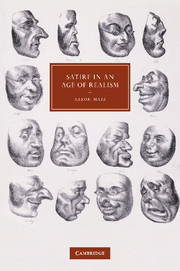Book contents
- Frontmatter
- Contents
- Preface
- Acknowledgments
- 1 Augustan satire and Victorian realism
- 2 Terminal satire and Jude the Obscure
- 3 George Gissing's ambivalent realism
- 4 The English critics and the Norwegian satirist
- 5 Truth and caricature in The Secret Agent
- Epilogue
- Notes
- Bibliography
- Index
- CAMBRIDGE STUDIES IN NINETEENTH-CENTURY LITERATURE AND CULTURE
2 - Terminal satire and Jude the Obscure
Published online by Cambridge University Press: 04 April 2011
- Frontmatter
- Contents
- Preface
- Acknowledgments
- 1 Augustan satire and Victorian realism
- 2 Terminal satire and Jude the Obscure
- 3 George Gissing's ambivalent realism
- 4 The English critics and the Norwegian satirist
- 5 Truth and caricature in The Secret Agent
- Epilogue
- Notes
- Bibliography
- Index
- CAMBRIDGE STUDIES IN NINETEENTH-CENTURY LITERATURE AND CULTURE
Summary
MOSTLY THE SATIRISTS
Two words haunted Thomas Hardy in the years he was plotting and composing Jude the Obscure. The first of these, satire, litters his notebooks and diaries of the era, and it appears with remarkable frequency in the finished novel itself. The word first surfaces when Jude receives his cousin Sue's letter stating her decision to marry his former schoolmaster Phillotson. The letter is brutally short; Sue is so formal that she signs her complete name. Hardy then shifts to Jude's reaction:
Jude staggered under the news; could eat no breakfast; and kept on drinking tea because his mouth was so dry. Then presently he went back to his work and laughed the usual bitter laugh of a man so confronted. Everything seemed turning to satire. And yet, what could the poor girl do? he asked himself: and felt worse than shedding tears.
The sentence in question seems deliberately vague, as if Jude's paranoid sense of victimhood cannot place the source of the cruel joke to which he has been subjected. The satire is on Jude. But from what or from whom does this satire issue – from Sue, or Phillotson, or God? This question may be simply another useless effort to pursue the elusive riddle of Jude the Obscure, which is the problem of knowing why Jude Fawley must suffer so intensely and relentlessly. The satirist in question must be elusive.
- Type
- Chapter
- Information
- Satire in an Age of Realism , pp. 37 - 69Publisher: Cambridge University PressPrint publication year: 2010

